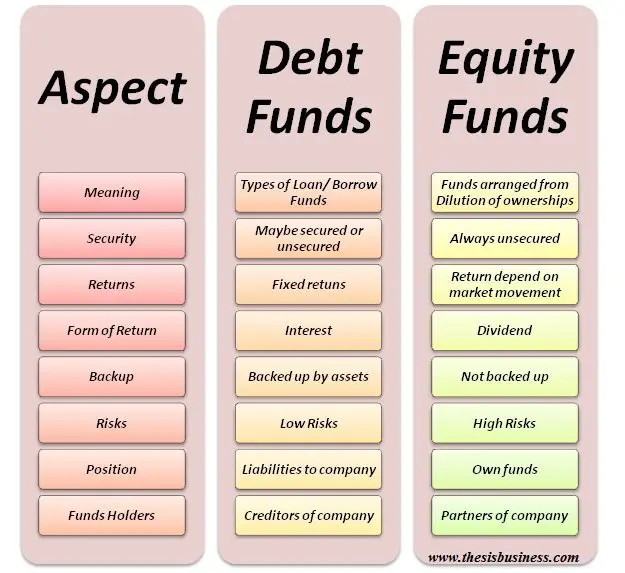Table of Contents
Differences Between Debt and Equity Funds:
This guide will help you to distinguish between Debt Funds and Equity Funds so that you will be able to clarify the pros and cons of both the options available. We need to understand first what does it meant by Debt and Equity Funds.
Therefore, for a detailed comparison between Debt and Equity Funds sit back and continue with this article.
Debt Funds vs Equity Funds:
Debt Funds refers to the financial instruments which offer the opportunity to invest in debt securities like Government Securities, Corporate Bonds, debentures, treasury bills etc. Debt funds typically provide a fixed rate of interest with lower risks.
When you invest your savings/ money in debt funds of any public or private or government entities, it becomes a type of loan/ borrowing for the respective organisations. That means the companies borrow the funds from investors like you and me for the purchase of its working capital and day to day expenditures. Hence in case of Debt Funds you are entitled to earn a fixed rate of interest on your investment.
On the other hand, Equity funds also known as equity shares or Stock Funds refers to some proportion of ownership that means shares of any company. The private or public or government organisations dilute their ownership in the form of equity shares to raise funds to meet their requirements and such raised funds are known as Equity Funds.
If you invest your money into equity shares, you won’t be able to earn fixed returns, however, in the long run, you might get a higher return as compared to Debt Funds.
There are plenty of mutual fund plans are available in the market, some of them offer Debt Funds Investment opportunity whereas some offer equity funds investment. Depending upon your ability to take risks as well as expected returns you should select your mutual fund plans.
In other words, mutual funds can be classified mainly in two category- Debt Funds and Equity Funds/ Stock Funds.
Those mutual funds which invest the collected funds from investors like you and me in debt instruments (debt funds) such as government bonds, corporate bonds, treasury bills, debentures etc. are called Debt Funds.
Whereas, the mutual funds which invest the majority of gathered funds from different investors in equity shares like stocks, IPOs, FPOs etc are known as Equity Funds.
Now before purchasing any of the mutual fund plans let us understand the key differences between debt and equity funds.
Difference between Debt and Equity Funds Chart:
 |
| Comparison Chart Debt Funds vs Equity Funds |
7 Key Differences between Debt and Equity Funds:
- Debt Funds are more secure than Equity funds.
- Debt Funds offer fixed interest rates on the other hand equity funds don’t provide any interest on investment.
- Debt funds provide interest on your investment whereas Equity funds provide dividend on acquired shares.
- Debt funds (debt instruments) are issued against some collateral whereas, in case of equity funds, the issuing company doesn’t require to mortgage its assets.
- Debt instruments holders are the creditors of the company whereas Equity shareholders are the partners of the company.
- Debt funds are the company’s liabilities which has to be paid off after a stipulated time period whereas Equity funds might be said the company’s funds which needn’t be paid off.
- Thus debt funds carry low risk and fixed returns, on the other hand, Equity funds carry higher risks and higher returns in the long run.
- Debt funds are secured, lower returns but fixed and assured returns over time.
- Equity Funds are always unsecured, higher returns if invested for a longer time period, but can make your investment to even zero depending upon performance and financial conditions of the company when the stock market crashes.
- Thus depending upon investor’s consciousness, risk-taking ability and expectation of returns he should invest whether in debt funds or equity funds.
7 Key Differences Between Bonds and Debentures
What are Debentures?
Types of Debenture
